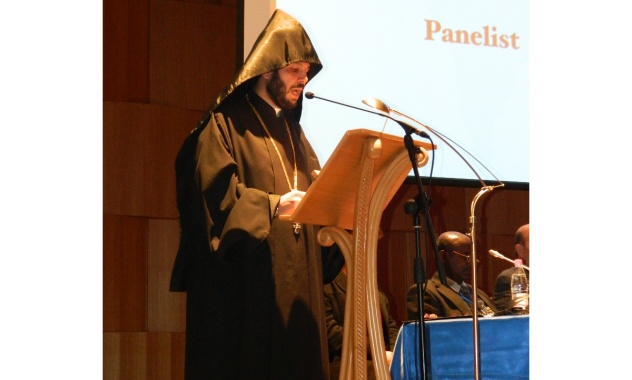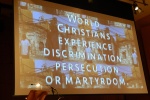Russian Orthodox Church representatives attend Global Christian Forum on persecution against Christians
On November 2-4, 2015, the forum was held in Tirana, Albania, under the theme ‘Discrimination, Persecution, Martyrdom: Following Christ Together.’ Some 150 participants from various countries assembled to consider the phenomenon of Christian martyrdom today, with many representatives of communities coming from regions in which Christians are subjected of severe oppression and persecution.
During the first day of the forum, the Divine Liturgy was celebrated at the Cathedral of the Holy Resurrection. Led by His Beatitude Anastasios, Archbishop of Tirana and All Albania, hierarchs of Local Orthodox Church prayed in the sanctuary. Among them were Metropolitan Gennadios of Sasima (Patriarchate of Constantinople), Metropolitan Isaac of Germany and Central Europe (Patriarchate of Antioch), Metropolitan Basil of Constanza (Orthodox Church of Cyprus), Bishop Anthony of Kruja (Albanian Orthodox Church).
The Moscow Patriarchate was represented by Archpriest Mikhail Gundyaev, Russian Orthodox Church representative to the World Council of Churches, member of the Executive Committee of the Global Christian Forum, and the Rev. Dimitry Safonov, head of the DECR section for interreligious contacts.
The conference was organized by the Global Christian Forum and held at the conference hall of Tirana’s cathedral. It was organized as an open dialogue of representatives of Christian communities. The discussion was moderated by the Global Christian Forum secretary Larry Miller.
The forum was opened by His Beatitude Archbishop Anastasios, who spoke about the severe persecution to which the faithful in Albania were subjected under Enver Hoja and the experience of restoring the Orthodox community after the period of persecution.
The president of the Pontifical Council for Promoting Christian Unity, Cardinal Kurt Koch, read out a message from Pope Francis of Rome, which stressed that ‘the communio martyrum is the greatest sign of our journeying together’. Speaking on behalf of the World Council of Church was its secretary general Olav Fyske Tweit. The opening concluded with a program speech by the founder of the Community of St. Egidio, Prof. Andrea Riccardi, on the theme ‘Discrimination, persecution, martyrdom in the 20th century’. He described the past century as ‘an age of martyrdom’ and focused on the new martyrs of the Russian Church, whose assembly is headed by Patriarch Tikhon. He also cited examples of contemporary martyrs for Christ and presented a survey of the regions in which the persecution of Christians is the strongest in our days, calling them ‘an atlas of crosses’. He called to pray for Metropolitan Paul of Aleppo (Patriarchate of Antioch) and Metropolitan Mar Gregory John Ibrahim of Aleppo (Syrian Orthodox Church), who were kidnapped two and a half years ago, and for the two hundred Assyrian Christians captured by ISIS this year.
The first plenary session was devoted to evidence from the Middle East communities. The address of Bishop Shahan Sarkissian, which was read out by his substitute, was about the situation of the Armenian community in Aleppo, from which the bishop could not get out. Evidence was given about the death of civilian Christians at the hands of extremists and the destruction of Armenian churches in Aleppo. Today divine services are conducted only in one church there. The bishop called to pro-active defense of Christians, development of dialogue with Islamic communities and providing humanitarian aid.
The general secretary of the Fellowship of Middle East Evangelical Churches, Ms Roseangela Jarjour, gave evidence of the cruel abuse to which Christians in Syria are subjected by the so-called Syrian Free Army and the An Nusra Front.
During the second day of the forum, representatives of Christian communities from safer regions spoke about ways of giving aid and support to the persecuted brothers.
On November 4, there was a plenary session under the theme ‘Together on the path of the suffering Church’. The speakers were bishops of persecuted communities who proposed ways of protecting Christians. Bishop Jean Kawak, Jacobite Syrian Church, said that Christians should be persuaded not to leave the Middle East countries. The forum heard a video-address by Bishop Angaelos, Coptic Church in Great Britain, who shared his thoughts about ways of opposing the anti-Christian persecution.
The forum concluded with the adoption of a final document which outlines practical ways for further opposition to the discrimination and persecution of Christians. In the evening, a grand reception was given in honour of the participants in the forum on behalf of the President of Albania.
DECR Communication Service






























